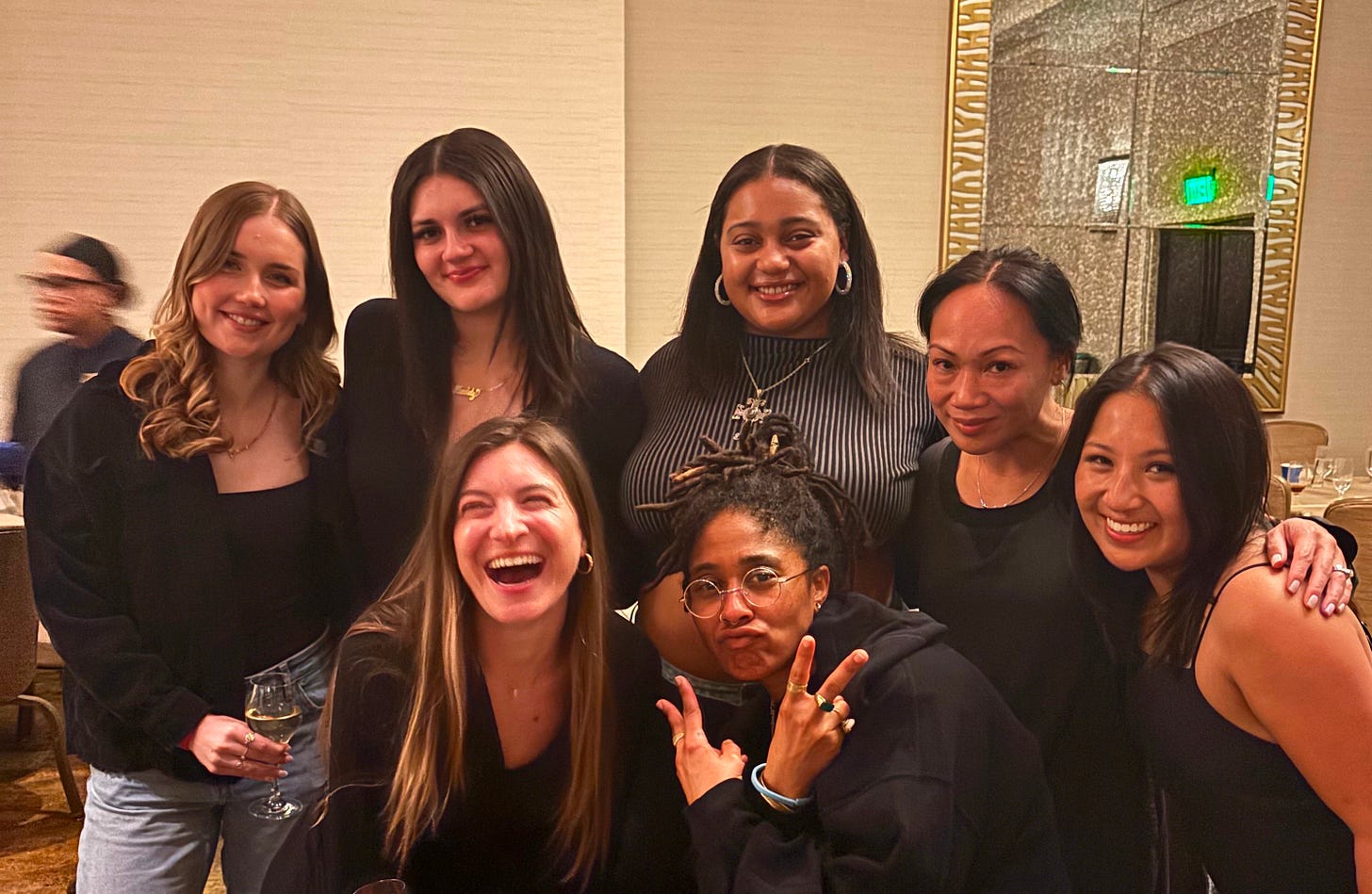I am a significantly better squash player than my official ranking suggests, and it’s been that way for a long time now.
“How is it possible that you’re not a 3.0-level player?” my coach David asked in disbelief when I shared my ranking earlier this year. He sometimes poses rhetorical questions that make me quietly reevaluate my entire life.
Squash rankings run from 1.0 to 7.0. For years I’ve been stuck at around a 2.7. Like a GPA, once this ranking is set at a particular level, it’s hard to dramatically raise it unless you’re playing—and winning—a lot.
I play often and I’m a familiar face in my squash world, but I dread competition and I tend to avoid recorded matches. We have an internal league at my club and I find all the emails about it unbearably annoying. I recently told a newcomer that the league would “ruin his life,” which was perhaps excessively strong language.
I don’t know why I have such a hard time winning. Part of me resists winning because I don’t want to cause conflict with opponents or make them dislike me. In addition, the prospect of winning in this area of my life is so alien that I don’t know how I would handle the change if it happened. I also have an irrational fear that if I won in an upset victory and there were no witnesses—many scored matches are not referee-ed by a third party—no one would believe me.
The squash season runs from the fall to the spring. Every May, my club hosts an internal championship, and this year I made it to the quarterfinals. We have plaques and posters on the walls with the names of past winners. It’s a whole thing.
I knew my opponent, and I believed that I was the stronger player. Despite that data, however, I got onto the court that night expecting for one reason or another to lose.
I think we went to five games. I lost. I don’t remember much, but there were a handful of points I gave up and should not have. I walked off the court in a cloud of ambient fury.
I found my coach finishing up a lesson a few courts away. “I need to talk to you, right now,” I demanded. I find it hard to repress my drama in this sport.
My coach always starts looking a little involuntarily tired when I walk into the room, and that night was no different. He wordlessly gestured to me to follow him into the glass-enclosed coaches’ office for a post-mortem. It was a little embarrassing, like being led to the principal’s office, but I didn’t care.
My coach and I have the sort of relationship where he’s my best friend, but I’m not his best friend. For his birthday I got him a mug that says: “You know what that sounds like? Not my problem.” If the Dalai Lama and a magic 8 ball had a baby, it would be my coach. Talking to him is like visiting an oracle on a mountain. If I had to phone a friend to make a major life decision, it would be this man. (I actually don’t have his number, which has been good for our relationship.) I have to actively restrain myself from asking him how to live my life instead of just how to fix my swing. Several times I’ve accidentally called him “Uncle.”
I can be a little, like, annoying with him. The only way I know I haven’t totally alienated David is that when I lose a point and he’s watching through the back glass wall, he reacts with exactly the same pained wince that my dad would make during my spelling bees as a child, when I was given a particularly hard word.
So there I was in the coaches’ office. David asked me with a puzzled tone I know well: “Why are you so upset?”
“I don’t know,” I replied. “Because I lost.” But I lose all the time, I thought.
Then David followed up with a question I would have ordinarily dismissed as annoying, ponderous therapy-talk.
“But what is your anger about losing protecting you from?” he asked me.
I enjoy telling my coach the honest truth, even when it sounds crazy. I recently told him my theory that my kneecaps will eventually fall into my ankles from overuse. An honest response came to me. “Because I will treat myself so terribly for my mistakes that it actually would have been better not to play at all.”
It’s hard to see the truth of who you are and to say it out loud. How you play a sport is often how you behave in other areas of life. In sports I give up points. At work I sometimes leave money on the table. I often don’t verbally call out opponents if I have been wronged because I’m afraid of being dismissed or mistrusted. I’m overly lenient. I’m a lover, not a fighter. When people violate my boundaries I fixate on the fact that I could have been tougher or stronger. I make it my fault.
“You are going to need to find a way to have a better relationship with yourself if you continue on in this sport,” my coach warned me.
I didn’t really have anything to say back. David adjourned our meeting and sauntered away to a far court, probably to go deal with another squash problem-child.
“Yep, he’s my best friend,” I said to myself as I watched him walk away.
That’s kind of my whole problem. I think everyone is my best friend. It’s so endemic to my hardwiring that I don’t think I could change this quality if I tried. I will probably spend the rest of my career—the rest of my life—attempting to correct for this aspect of my personality.
People often say, “It’s just a game,” or “It’s just as sport.” If only that were true. Within the intimacy of an enclosed, four-cornered squash court, I can’t hide who I am from myself or from my opponent.
I have assets as a player. I can frequently predict where my opponent will put the ball based on my intuition about that individual’s personality. I’ll run for anything, and often I’ll get a piece of it. I am disciplined enough to finish off a point with a short, soft shot rather than a hard, deep one that would be more fun to execute. My serve is strong.
Yet I tend only to see my weaknesses: my passivity, my fear of calling out a bad shot and my subsequent inability to let it go. I see my seeming lack of ferocity.
In certain moments of competitive play I try to conjure that ferocity by thinking of something or someone that makes me angry. Often I’ll actually think of previous opponents who took advantage of me. When an opponent interferes with your shot, you’re supposed to call it out and replay the point. I often do not and then I feel angry later. But that anger often putters out after one or two points. It’s not enough to win a whole match.
An old colleague once used to call me “the fawn.”
“No, I am a tiger,” I would reply, kind of as a joke.
“It’s okay to be a fawn,” she would say back. “It’s who you are.”
Is it okay, though? When do you “fix” parts of yourself that are holding you back, and when do you let those qualities exist peacefully? And if you are going to let certain unhelpful qualities remain intact, how do you resist the urge to constantly berate yourself for having them?
Up until this point, the only strategy I really had to deal with my shortcomings was to hide them and to punish myself for them. That strategy is becoming less and less effective now.
To win at sports, you do need to access a certain Beast Mode inside yourself. I know a lot of people who can effortlessly slip into that mindset. They are tigers, not fawns. New York City is full of them. In certain parts of my life I have had trouble accessing my inner tiger, let’s say.
Imagine my surprise, then, when I unexpectedly accessed Beast Mode a few weeks ago through a wholly unplanned route.
I was playing in the Howe Cup, which is the biggest tournament in women’s squash. I was scheduled to play five matches over the course of the three-day tournament. The Howe Cup is David’s favorite tournament, but sadly he wasn’t coaching this one. I knew I would have to channel his advice telepathically.
I lost my first game, and I felt that familiar disappointment in both the circumstances and myself.
But then suddenly, something clicked. It’s been a frequent source of shame for me that I have given up points in life. I have incurred losses from over-giving. But what if I just owned it? What if I got onto the court knowing that I am this way, and that it’s okay? What if I could even find it kind of amusing? Was there a way I could preemptively accept that I would incur losses for being myself, and just get on with my life?
I won my next four matches. It was surreal. Playing was a more pleasant experience this time. When I blew a kiss to someone off-court during a warmup and missed a shot, I resisted the urge to feel embarrassed. When I made an error, I tried literally laughing it off. It worked. It’s a relief to stop taking yourself so seriously, even for a moment.
People have sometimes taken advantage of me. I have spent a long time replaying those moments to see how I could have been more assertive, more of a fighter. I have endlessly criticized myself for being overly friendly, for failing to prevent people from overtaking me. It’s been hard to fondly remember some past achievements of mine because they are speckled with evidence of my fawn-ness.
However, anything lasting that you create—anything that is really yours—will have both your good and bad qualities embedded within it. The fingerprints on your creations contain all your multitudes. It is better to see your darker aspects in your creations—to look at them and accept their presence without flinching—rather than to hide those creations away because they remind you of your weaknesses.
My squash ranking is higher than ever.
This is the last newsletter for 2024. See you in January.
Thank you to David Hughes of Open Squash for all his wisdom on and off the court.
Michelle Ann Daniels composed a song with vocals by Cantor Chaim Berson—listen below. It’s one more great Ramaz/KJ collaboration.








You a bad ass fawn
Congratulations for the wins!! Hard work pays off! 👍